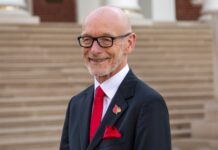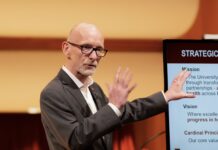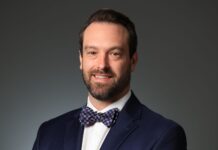“Because of professor Arnold’s instruction, I see the world differently now,” writes former student Lisa Matthews. “I can hardly drive down a road without wondering who owns the property and if there are any easements on it and what kind they might be. I also look at the water I see and wonder where did it come from and where does it go?”
A big believer in the adage that people learn best by doing, Arnold, who is also the chair of the Center for Land Use and Environmental Responsibility, challenges his students to integrate service learning, research and “getting their boots muddy” as part of his classes. He calls this approach “an ecosystem of learning”— an apt term since protecting the environment is his passion.
“I had always loved nature and the outdoors, but my law school education helped me see the relationships among social policy and environmental policy,” Arnold wrote in an email response to a reporter’s questions.
As early as elementary school, Arnold knew he wanted to study law. After finishing an undergraduate degree at University of Kansas, he went to law school at Stanford University as a Truman Scholar and, upon graduation, began practicing environmental law. But his love of learning eventually brought him back to the classroom. After teaching at several universities, he came to UofL in 2005.
When asked about his interests and teaching style, Arnold used the word interdisciplinary (or a similar word) 16 times in his email response. That’s not surprising. His penchant for cross disciplinary-get-out-of-your-comfort-zone learning has made him a bit of a legend among students.
“I had never spent so much time in the west end of Louisville,” writes former student Anshu Anand who took Arnold’s Land Use Planning class. “I was astonished by the proximity of businesses (particularly factories) that were extremely close to residential areas. During that semester, not only were we taught environmental law, but more importantly we were taught a lesson on community values.”
Comments like this are important to Arnold because it means that he has been successful in getting students engaged and thinking.
“The most important thing that needs to happen in a course is that students see how they can use their education to make a difference in the world,” Arnold said.
As a Trustees Award winner, Arnold receives $5,000 and will speak at the commencement ceremonies May 11.

























